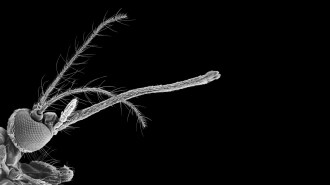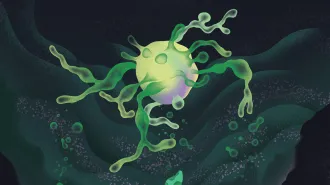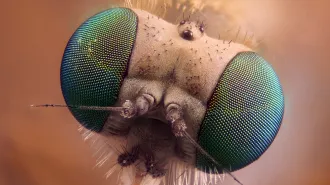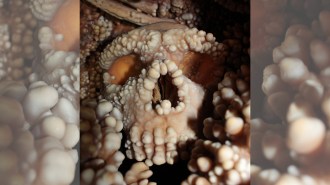- More than 2 years ago
The most predictable mammalian chromosome has a wild side. The X chromosome — long thought to be pretty much the same across mammals — actually harbors a collection of naughty genes that differ between species and switch on in the testicles.
The genes could play starring roles in sperm production and in the evolution of mammalian species.
“It’s very surprising,” says Jacob Mueller of MIT’s Whitehead Institute for Biomedical Research. “You have this everyday collection of genes that everybody is familiar with, and then you have this mysterious side.”
Female mammals have two copies of the X chromosome, while males have one X and one Y. Biologists have thought since the mid-1960s that the genes on the X chromosome stayed the same as placental mammals diversified. The human X chromosome was sequenced in the early 2000s, and the genes found seemed to support that idea. But Mueller says the patchwork state of the sequence — a mosaic of segments threaded together from 16 donors — raised the possibility that sly genes were slipping under the radar.
So Mueller, Whitehead geneticist David Page and colleagues carefully sequenced the X chromosome of a lone male donor using a precise technique Page’s lab had previously developed. The researchers then compared the sequence with that of the mouse X chromosome. The researchers reported July 21 in Nature Genetics that 18 percent of human and 23 percent of mouse X chromosome genes had no match in the other species. Most of the loose cannons are expressed predominantly in the testicles, and must have arisen in the 80 million years since the mouse and human lineages split.
The researchers don’t know what the genes do, but their DNA sequences point to involvement in the packaging of genetic material — a crucial step for making sperm.
While some of the genes switch on in the cells that make sperm, others turn on in the sperm cells themselves, which each contain only one sex chromosome, an X or a Y. Mueller says the genes could have evolved to facilitate competition between X- and Y-bearing sperm for fertilization of the egg.
Because males have only one copy of the X chromosome, any changes that take place on the chromosome are rapidly exposed to natural selection, and thus the newfound genes are likely beneficial. By contrast, changes in other human chromosomes are buffered by the existence of another copy. Rapid changes in the X genes expressed only in males could play a role in the evolution of new species, says geneticist Michael Zwick of Emory University in Atlanta.
“What’s exciting about the paper is it really shows the striking impact of natural selection,” says Zwick. The next step is to find out what the genes do.







